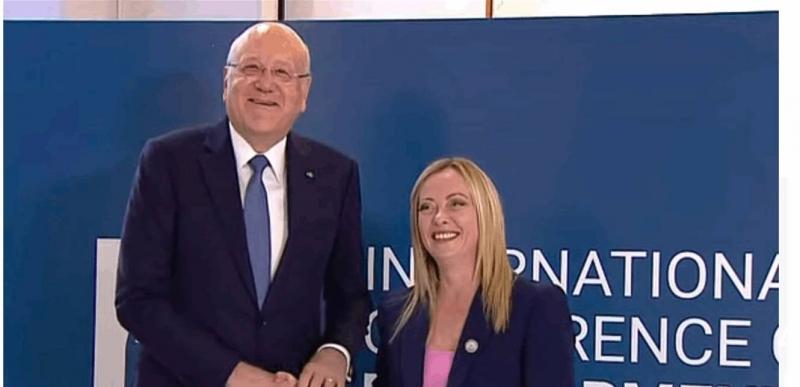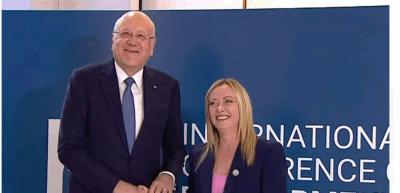Mediterranean nations, along with others from the Middle East and Africa, agreed on several steps today, Sunday, to attempt to slow the pace of irregular migration and address some pressures pushing migrants to leave their countries and attempt to reach Europe. A draft outcome from a one-day meeting hosted by Italy showed a commitment to crack down on human trafficking and improve cooperation between European and African countries in areas such as renewable energy.
The caretaker Prime Minister Najib Mikati emphasized during his participation in the Rome conference on migration across the Mediterranean, at the invitation of Italian Prime Minister Giorgia Meloni and the Italian government, the need to address irregular migration and the refugee situation in Lebanon. He affirmed the importance of holding a dialogue table or an international conference that brings together all concerned countries and parties.
Mikati viewed the "Rome Process" meeting as a first step toward establishing a strong strategic partnership and enhancing coordination between the European Union, Mediterranean countries, and Lebanon. He stated, "Our common goal is to effectively tackle the refugee crisis, in a manner that aligns with the expectations of the region's residents, safeguarding peace and security in Lebanon, and assisting Europe in addressing some issues related to migration and development, with the priority of preserving lives and internal stability and security in our countries."
He continued, "Although Lebanon has not signed the 1951 UN Refugee Agency Convention, the flexibility and compassion shown by Lebanon in providing shelter and assistance to Syrians during the Syrian war, despite extremely limited resources and a severe lack of attractive job opportunities in the country, should be recognized. The Lebanese welcomed refugees with open arms and shared everything they had to support them during these difficult times. Seventy-five years of tormenting challenges, conflicts, cyclical wars, intergenerational disappointments, lost opportunities, and inadequate development strategies exceed a single country's capacity to bear."
In response to questions about what these refugees envision for their future—whether they see Lebanon as their permanent home or aspire to reach Europe in search of better opportunities and stability—he answered, "The Lebanese government's position on this matter is as follows: now that the conflict in Syria has ended, we need to establish a plan for the safe and guaranteed return of all refugees to their homeland. International organizations and donors should redirect funds from financing their stay in Lebanon to incentivizing individuals and families who decide to return home."
Currently, the situation in Lebanon is particularly critical after hosting one of the largest numbers of refugees relative to its population in the world. This current situation is becoming increasingly unsustainable by the day. Lebanon, a relatively small country with a population of 5 million, is now responsible for accommodating approximately 2 million Syrian refugees. To illustrate this situation: it would be equivalent to Italy hosting and welcoming 20 million refugees. This disproportionate burden places immense pressure on the country's infrastructure, economy, and social fabric, which was already severely affected by an unprecedented economic and financial crisis.
Unfortunately, the recent decision by the European Parliament (RC-B9-0323-2023) seems to overlook the complexities and multifaceted challenges Lebanon faces. Rather than recognizing my country's resilience and the vigilance of the Lebanese Armed Forces in the face of the refugee crisis, we find ourselves being blamed or, rather, punished for our hospitality and efforts.
He added, "Thus, I would like to reiterate Lebanon's disappointment with the recent decision issued by the European Parliament. This decision is a clear violation of Lebanese sovereignty and does not take into account the concerns and aspirations of the Lebanese people. The pressure imposed by this crisis on us and the severe implications of the long-term presence of displaced Syrians in Lebanon destabilizes the social fabric of the country and poses a direct threat to its existence as a model of diversity. Lebanon has borne this heavy burden of hosting Syrian refugees for 12 years while my country is experiencing the worst economic crisis in its history. Our resources are extremely limited, if they exist at all, to contain the impact of this refugee crisis on the fabric of Lebanese society and infrastructure in general."




